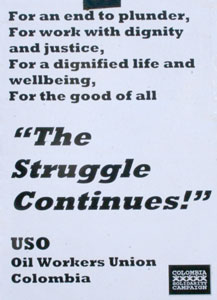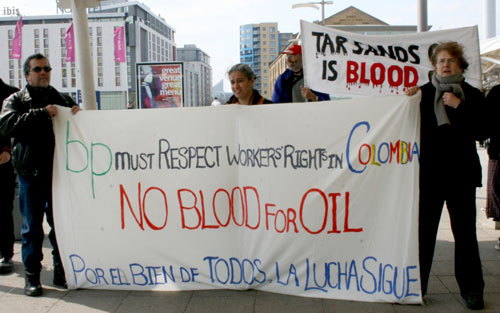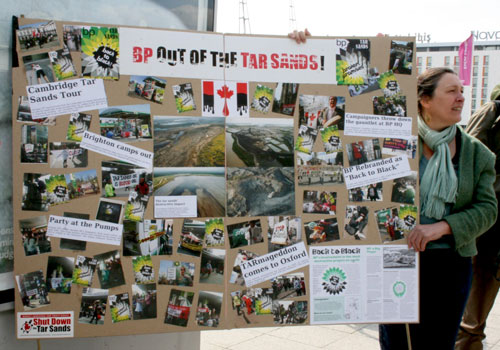 On Thursday 15 April a team from community group COS-PACC, Espacio Bristol-Colombia and the Colombia Solidarity Campaign entered the BP AGM to press the Petition of Demands drawn up by the Movement for Dignity of Casanare: for a union collective agreement, for environmental and human rights protections, for real social investment and for the corporation to take goods and services from local suppliers.
On Thursday 15 April a team from community group COS-PACC, Espacio Bristol-Colombia and the Colombia Solidarity Campaign entered the BP AGM to press the Petition of Demands drawn up by the Movement for Dignity of Casanare: for a union collective agreement, for environmental and human rights protections, for real social investment and for the corporation to take goods and services from local suppliers.
While outside we picketed alongside the Stop the Tar Sands campaign and distributed a summary of the Petition of Demands to shareholders, inside we handed over a letter to BP Chairman Carl-Henric Svanberg with personal signatures by 3,400 casanareños insisting that BP respects the popular movement’s choice of representatives in talks around these five themes.
The talks were scheduled from 14 to 16 April in Tauramena, Casanare. Late on 14 April we received a copy of the letter that BP Colombia had sent to the workers union USO in response to their and the community’s Petition of Demands. BP Colombia were playing hard ball:
-
"We reject as injurious and far from all reality the imputations against the company made in the document. Given the seriousness of the same and convinced that our conduct has been according to the law, BP will make known the content of these imputations to the competent authorities so that [they might] take the corresponding action.
-
BP does not give the document the character of a "Petition of Demands" for the conclusion of a Collective Agreement, as is mentioned there, as in complete conformity with the law this mechanism, established to start a collective labour negotiation, is only possible between, on the one hand, one or two employers or employers associations, and on the other, with one or several trade unions or union federations that represent the unionised workers in these same employers, which is clearly not fulfilled in this case."
In the Colombia context the declaration to "make known the content of these imputations to the competent authorities so that [they might] take the corresponding action" is a clear threat. Denying legitimacy to critics of BP makes them all the more vulnerable to extra-legal as well as legal attacks. It was therefore important to know from the BP group executives did they accept the legitimacy of the Petition of Demands?

Espacio Bristol-Colombia picks up the story:
"We entered nervously into the luxurious and modern Excel convention centre in London, but with all the wonderful people we have met and have worked with in Casanare giving us strength and a strong mandate; put pressure on BP to accept as legitimate the list of demands that the Movement for the Dignity of Casanare has presented to one of the world’s most powerful multinational corporations.
It was an immense stage that made clear their symbolic, economic and political power, as well as their huge egos. Their power is all too real; their decisions in Casanare have affected the lives of Casanare people through the intense militarisation and human rights violations which oil exploration brought to the region in the nineties.
It was to their home turf that we brought the voice of the Casanare people, who in spite of the 9000 people dead and in spite of fear, have risen up again and demanding dignity, the right to a trade union, respect for the environment they are dependent on, respect for life and better living conditions. We asked BP if they considered the demands of the communities to be legitimate considering BP has benefitted for 16 years from the oil that flows from this region.
They responded our question saying that they knew of some dialogue happening in Casanare, which is important, but it was not to do with BP. Considering that BP has been in negotiations and meetings with the Movement in Casanare for the past six weeks we pondered whether a lack of capacity to tell the truth is seen as a strength rather than a weakness when applying for a multimillion pound job with BP.
We took the microphone again, telling the audience that what BP said was not the case and that the problem was with BP. We also made clear that the chair’s failure to recognise at the very least the legitimacy of communities to demand better environmental, social and labour conditions is very dangerous in the context of Casanare. Every time community organisation have raised their voices against BP, community leaders have been killed and the organisations destroyed. BP’s public affirmation of the legitimacy of the right to protest would have been a minimum measure to prevent history repeating itself. They would not do so.
We also shared with the audience that only the night before BP had indeed responded to the list of demands presented by the communities saying that they not going to negotiate with them and furthermore they were going to sue them for slander. This is how a multimillion pound multinational corporation responds to communities asking for some dignity.
Later in the meeting George Poitras, a First nations Indigenous spokesperson, began his intervention about the impact of Tar Sands operation in his lands saying "When i heard my friend from Colombia speaking about what BP has done in his country, my heart bled. We hope that this won’t be what their presence brings to our lands.".
As we left the convention centre, friend on the outside shouted "Canada, Colombia, No Blood for Oil". In the sunshine we gave a summary of what had happened inside. We were angry but not surprised by the manipulation and lack of answers inside, we were confident that our actions had served as a protection mechanism for our friends back in Colombia and that BP knows the political costs are high for any future repression in Casanare, and we were excited by the solidarity between Colombians, British and Canadians. Solidarity is our own form of beautiful power, not over but between people, that will be crucial for the ongoing mobilisations in Casanare and for the communities in Canada."
http://gizzacroggy.blogspot.com/

In the AGM BP Chairman Svanberg presented the complaints as being against the pipeline company Ocensa, rather than BP itself, but this is clearly not the case otherwise why did BP Colombia write such a harsh letter to USO? In any case, on the ground it is BP that project manages production and makes all the key decisions.
Svanberg dodged answering the straightforward question – does BP consider the workers and community’s demands legitimate? This is in contrast to his acknowledgement that the Tar Sands campaigners raise "legitimate concerns on an aspect of our business". BP has still to decide whether it will proceed in investing in Tar Sands extraction, yet the people of Casanare have been dealing with the actual impact of its operations since the early 1990s.
So, cannot Colombians also raise legitimate complaints and demands against BP? Certainly, the corporation has yet to recognise this in practice. It was forced into talks by the effectiveness of a one month strike and community mobilisation, but the 14-16 April round in Tauramena ended without any substantive progress. The next round of talks is due to take place at the end of April. We will remain attentive to the situation and ready to continue mobilising as required.
Email actions:
Send message of concern pressing acceptance of the Petition of Demands to (40% pay rise voted at AGM) BP’s Executive Director and Group Chief Executive Tony Hayward at email: tony.havward@bp.com
Send solidarity message to Movimiento por la Dignidad de Casanare – Colombia at email: movimientoporcasanare@yahoo.es
Information:
Summary of the Petition of Demands see URL
David vs Golitah – video report on Casanare’s complaints and mobilisation:
http://www.youtube.com/watch?v=5RSBqe1OSmY&feature=channel
Thanks to friends in the (Spanish oil multinational) Repsol Kills campaign, a mobilisation also took place in Barcelona on 14 April, see
http://barcelona.indymedia.org/newswire/display/392841/index.php
http://repsolmata.ourproject.org
The case against BP in Colombia will be presented to the Permanent Peoples Tribunal hearing at the Linking Alternatives summit in Madrid 14-18 May.
http://tni.org/article/people%E2%80%99s-summit-enlazando-alternativas-4
‘Party at the Pumps’ Stop the Tar Sands takeover of a BP petrol station on 10 April:
http://london.indymedia.org/articles/4613
BP + Tar Sands = Climate Crime

